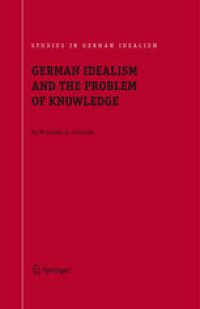
Ebook: German Idealism and the Problem of Knowledge: Kant, Fichte, Schelling, and Hegel
Author: Nectarios G. Limnatis (auth.)
- Tags: History of Philosophy, Modern Philosophy, Philosophy of Mind, Epistemology, Logic, Philosophy of Science
- Series: Studies in German Idealism 8
- Year: 2009
- Publisher: Springer Netherlands
- Edition: 1
- Language: English
- pdf
Nectarios G. Limnatis received a Ph.D. (2004) from the Department of Philosophy, Graduate Faculty of Political and Social Science, New School for Social Research, and another Ph.D. (1996) from the Faculty of Philosophy, Moscow State University. His research interests span the History of Philosophy (particularly, German Idealism from Kant to Hegel and Marx), 20th Century Continental Philosophy, Social and Political Philosophy, and Ethics. He has taught at various universities in Europe and the USA, and is currently teaching at Hofstra University in New York. Besides articles and book reviews in several languages, he has written Manipulation: Essence, Appearances, Ways of Sublation (Moscow: Ekonomycheskaya Demokratya 2000, in Russian), and co-edited Prospettive sul Postmoderno, vol. 1: Considerazioni epistemologiche, vol. 2: Ricerche etico-politiche (Milano: Edizioni Mimesis, 2006, in Italian). At present, he is working on the edition of a book called The Contours of Hegel’s Dialectic (forthcoming). Further projects include A Critical Theory of Globalization and Hegel and Analytic Philosophy.
The problem of knowledge in German Idealism has drawn increasing attention in recent years. This is the first attempt at a systematic critique that covers all four major figures, Kant, Fichte, Schelling, and Hegel. In examining the evolution of the German idealist discussion with respect to a broad array of concepts (epistemology, metaphysics, logic, dialectic, contradiction, totality, and several others), the author draws from a wide variety of sources in several languages, employs lucid and engaging language, and offers a fresh, incisive and challenging critique.
Limnatis contrasts Kant’s epistemological assertiveness with his ontological scepticism as a critical issue in the development of the discourse in German Idealism, and argues that Fichte’s phenomenological demarche only amplifies the Kantian impasse, but allows him to launch a path-breaking critique of formal logic, and to press forward the dialectic. Schelling’s later restoration of metaphysics aims exactly at overcoming the Fichtean conflict between epistemological monism and ontological dualism. And it is Hegel who synthesizes the preceding discussion and unambiguously addresses the need for a new philosophical logic, the dialectical logic. Limnatis scrutinizes Hegel’s deduction in the Phenomenology, invokes modern genetic epistemology, and advances a non-metaphysical reading of the Science of Logic as a genetic theory of systematic knowledge and as circular epistemology. Emphasizing the unity between the logical and the historical, the distinction between intellectual (verständlich) and rational (vernünftig) explanation, and the cognitive importance of contradiction, the author argues for the prospect of an evolving totality of reflective reason.